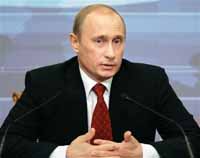Putin praises economic growth, shows suspicion of U.S. in annual news conference
President Vladimir Putin, in his annual news conference, on Thursday portrayed Russia as economically robust, a victim of unfair suspicions abroad and itself wary of U.S. intentions.

The news conference, always one of Russia's main media events, this year set new records for its length 3 hours, 32 minutes, six minutes longer than last year's and the number of journalists accredited: 1,232.
Putin began by praising Russia's economic growth, but added that the government has much to do to reduce inequalities in Russians' standards of living.
Putin said growth of 6.7-6.9 percent in the country's gross domestic product last year and increased spending on education and public health were signs of Russia's continued recovery from its economic troubles of less than a decade ago.
"But we still have to do very much in the social sphere," including "reducing the gap between highly paid groups of the population and the citizens of our country who still live very, very humbly," Putin said.
With the end of Putin's second term approaching and the March 2008 election drawing closer, one issue of key interest was who would succeed him. The constitution limits Russian presidents to two consecutive terms, and the nation has not had a normal transfer of power by popular vote in its post-Soviet history.
The Kremlin is widely believed to be grooming two Putin proteges as possible successors: First Deputy Prime Minster Dmitry Medvedev and Defense Minister Sergei Ivanov. Open support from the highly popular Putin for either man would virtually ensure his election.
"There will not be a successor, there will be candidates for the presidency," Putin said, adding that the government must ensure a democratic campaign.
"I reserve the right to express my preference, but this will be done only in the pre-election period," Putin said.
Russia's relations with the West are a perennial topic at the news conference, which gives foreign journalists a rare chance to directly ask Putin a question and gives Putin a chance to portray Russia, as he often does, as a country under attack from ill-wishers abroad.
This year, he spoke harshly against the United States' possible deployment of missile defense systems in eastern European countries that once were in the Soviet Union's sphere of influence. The U.S. says such systems would be aimed at intercepting possible missile attacks from Iran, but Putin scoffed at that claim and said Russia would take unspecified retaliatory measures.
"We consider such claims unfounded, and, naturally, that directly concerns us and will cause a relevant reaction. That reaction will be asymmetrical, but it will be highly efficient," Putin said.
Putin said that Russia's latest Topol-M intercontinental ballistic missiles were capable of penetrating missile defenses and added that more effective weapons systems are being developed.
Russia's reputation abroad has been battered by the killings late last year of two critics of the Kremlin: investigative journalist Anna Politkovskaya and former security agent Alexander Litvinenko, who blamed Putin for his radiation poisoning in a deathbed statement in London.
However, Putin dismissed the suggestion widely made by Russian officials and news media that the killings were part of a plot to discredit the Kremlin.
"Openly speaking, I don't believe in the conspiracy thesis," Putin said.
He declined to speculate how Litvinenko ingested the rare radioactive poison that killed him. "Only the investigation can answer that," he said.
The Kremlin also has campaigned to limit foreign involvement in key economic sectors and deepened Western concerns about Russia's reliability as an energy supplier in the wake of price disputes with Ukraine and Belarus that brought interruptions of Russian oil and gas to Western Europe via those countries.
Putin rejected suggestions that the country is using its vast energy reserves as a political weapon, reports AP.
"The thesis is being thrust on us all the time that Russia is using its old and new economic efforts to attain foreign political goals. It is not so," Putin said. He repeated Russia's contention that the price increases are driven simply by Russia's desire to get fair prices for its gas and oil after years of providing energy at below-market prices to ex-Soviet neighbors.
"We're not obliged to subsidize the economies of other countries," Putin said. "Nobody does that, so why are they demanding it of us?"
Subscribe to Pravda.Ru Telegram channel, Facebook, RSS!


